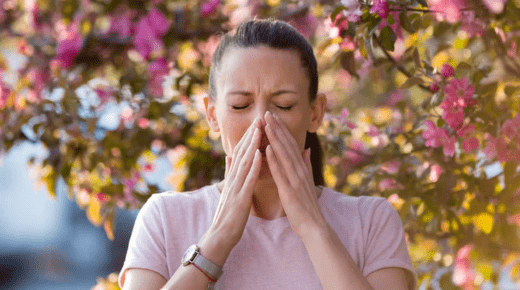25 Effective Ways to Control Sneezing Allergy
1. Identify Your Allergens: Know Your Triggers
The first step in controlling sneezing allergies is to identify what triggers your symptoms. Common allergens include pollen, dust mites, pet dander, and mold. Keeping a journal of your symptoms and when they occur can help pinpoint the cause. Once you know your triggers, you can take steps to avoid them.
2. Use Over-the-Counter Antihistamines: Quick Relief
Over-the-counter antihistamines like cetirizine (Zyrtec) and loratadine (Claritin) can provide quick relief from sneezing allergies. These medications work by blocking histamine, a chemical in the body that causes allergic symptoms. Antihistamines are available in various forms, including tablets, liquids, and nasal sprays.
3. Try Nasal Corticosteroids: Reduce Inflammation
Nasal corticosteroids are effective in reducing inflammation and controlling sneezing allergies. Medications like fluticasone (Flonase) and mometasone (Nasonex) can help alleviate symptoms. These sprays are used daily and can take a few days to reach their full effect, but they offer long-term relief.
4. Practice Good Hygiene: Minimize Allergen Exposure
Practicing good hygiene can help minimize exposure to allergens. Washing your hands and face regularly, especially after being outdoors, can remove pollen and other allergens. Showering before bed can also help prevent allergens from accumulating on your skin and hair.
5. Keep Windows Closed: Prevent Pollen Entry
During high pollen seasons, keep windows and doors closed to prevent pollen from entering your home. Using air conditioning with a HEPA filter can help filter out pollen and other allergens, providing a cleaner indoor environment.
6. Use a Humidifier: Maintain Ideal Humidity Levels
Using a humidifier can help maintain ideal humidity levels in your home, reducing the risk of mold and dust mites. Aim for a humidity level between 30% and 50%. Be sure to clean your humidifier regularly to prevent mold and bacteria growth.
7. Install HEPA Filters: Clean Indoor Air
Installing HEPA (High-Efficiency Particulate Air) filters in your home can help clean the air by trapping allergens like pollen, dust mites, and pet dander. Use HEPA filters in your vacuum cleaner and air purifiers to reduce allergens in your living space.
8. Avoid Outdoor Activities During High Pollen Times
Pollen levels are typically highest in the early morning and late afternoon. Avoiding outdoor activities during these times can help reduce exposure to pollen. Check daily pollen forecasts and plan your activities accordingly.
9. Wash Bedding Frequently: Remove Dust Mites
Dust mites can accumulate in bedding, causing sneezing allergies. Washing your sheets, pillowcases, and blankets weekly in hot water can help remove dust mites. Use allergen-proof covers on mattresses and pillows to further reduce exposure.
10. Use Saline Nasal Sprays: Natural Relief
Saline nasal sprays can provide natural relief for sneezing allergies by rinsing out allergens from your nasal passages. These sprays can be used several times a day to keep your nasal passages clear and moisturized.
11. Wear a Mask: Protect Your Airways
Wearing a mask when outdoors, especially during high pollen seasons, can help protect your airways from allergens. Choose a mask with a high filtration efficiency to effectively block pollen and other airborne particles.
12. Keep Pets Clean: Reduce Pet Dander
Regularly grooming and bathing your pets can help reduce pet dander, a common allergen. Keep pets out of the bedroom and off furniture to minimize exposure. Using air purifiers and vacuuming frequently can also help reduce pet dander in your home.
13. Use Allergy-Proof Bedding: Create a Safe Sleep Environment
Investing in allergy-proof bedding, such as mattress and pillow covers, can help create a safe sleep environment. These covers prevent dust mites and other allergens from accumulating, reducing nighttime allergy symptoms.
14. Avoid Smoking: Eliminate Irritants
Smoking and exposure to secondhand smoke can irritate your respiratory system and worsen sneezing allergies. Avoid smoking and stay away from areas where people are smoking to help keep your airways clear and reduce allergy symptoms.
15. Stay Hydrated: Keep Mucous Membranes Moist
Drinking plenty of water helps keep your mucous membranes moist, reducing the severity of sneezing allergies. Staying hydrated can also help thin mucus, making it easier to clear your nasal passages.
16. Practice Nasal Irrigation: Clear Nasal Passages
Nasal irrigation with a neti pot or saline rinse can help clear your nasal passages of allergens and mucus. Use a sterile saline solution and follow proper instructions to ensure safe and effective use.
17. Avoid Strong Scents: Minimize Irritants
Strong scents from perfumes, cleaning products, and air fresheners can irritate your nasal passages and worsen sneezing allergies. Choose unscented or hypoallergenic products to minimize exposure to these irritants.
18. Keep Indoor Plants: Improve Air Quality
Certain indoor plants can help improve air quality by filtering out allergens and pollutants. Plants like spider plants, peace lilies, and snake plants are known for their air-purifying properties. However, be mindful of any allergies to plant pollen.
19. Take Vitamin C: Boost Your Immune System
Vitamin C is known for its immune-boosting properties and can help reduce the severity of sneezing allergies. Incorporate vitamin C-rich foods like oranges, strawberries, and bell peppers into your diet or consider taking a supplement.
20. Use Essential Oils: Natural Remedies
Certain essential oils, such as eucalyptus and peppermint, can help relieve sneezing allergies. Using a diffuser or adding a few drops to a bowl of hot water and inhaling the steam can help clear your nasal passages and reduce symptoms.
21. Keep Your Home Clean: Reduce Allergens
Regular cleaning can help reduce allergens in your home. Dust surfaces, vacuum carpets and upholstery, and wash curtains and rugs frequently. Use a vacuum cleaner with a HEPA filter to effectively trap allergens.
22. Avoid Outdoor Drying: Reduce Pollen Exposure
Drying your clothes and bedding outdoors can allow pollen to cling to them, leading to increased allergy symptoms. Use a clothes dryer or hang items indoors to reduce exposure to outdoor allergens.
23. Try Probiotics: Support Immune Health
Probiotics can help support your immune system and may reduce the severity of sneezing allergies. Incorporate probiotic-rich foods like yogurt, kefir, and sauerkraut into your diet, or consider taking a probiotic supplement.
24. Consult an Allergist: Personalized Treatment
If your sneezing allergies are severe or persistent, consult an allergist. They can perform tests to identify specific allergens and recommend personalized treatment options, such as allergy shots or prescription medications.
25. Stay Informed: Monitor Allergy Forecasts
Staying informed about daily allergy forecasts can help you plan your activities and take preventive measures. Many weather websites and apps provide pollen counts and allergy alerts, helping you stay ahead of potential triggers.

